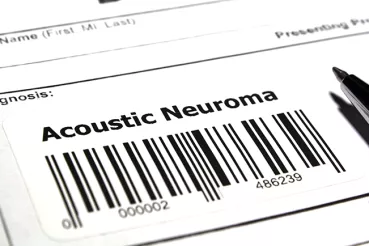Just as a ringing bell can sound a warning, ringing in your ears can be a signal to pay attention to your body.
Ringing in your ears, or tinnitus, starts in your inner ear. Most often, it is caused by damage to or the loss of sensory hair cells in the cochlea, or the inner ear.
Tinnitus can present in many different ways, including sounds related to the ocean, ringing, buzzing, clicking, hissing or whooshing. The sound can be in one or both ears, constant or occasional, loud or soft. Often, it is more noticeable at night when you're not distracted by work or family. It is often associated with hearing loss.
And it's more common than you might expect. Over the past year, about 10% of the U.S. adult population has experienced tinnitus lasting at least five minutes, according to the National Institute on Deafness and Hearing Disorders.
"It's not life threatening, and it is more of a symptom of other problems rather than a disease itself, but it can be debilitating," says Rush otolaryngologist Ashok Jagasia, MD, PhD. "In some people, the distracting sound can cause depression, anxiety and/or insomnia."
Causes of tinnitus
Why does tinnitus occur? The ringing actually comes from the part of your inner ear that looks like a snail shell called the cochlea. Changes in the cochlea's nerve activity could lead to tinnitus.
These changes can be caused by any of the following:
- Exposure to loud sounds — such as jackhammers, chainsaws and loud music
- A head injury or concussion
- Wax build-up in your ears
- Caffeine
- Many medications, including aspirin, ibuprofen, blood pressure medicines and some antibiotics
- Meniere's disease, a condition of the inner ear possibly related to fluids in the inner ear.
Coping with tinnitus
Though sometimes tinnitus will go away on its own, often it's there for the long haul.
While there is no cure, there are things you can try to help you cope. Here, Jagasia offers 10 strategies:
1. Consider cognitive-behavioral therapy.
At CBT sessions, you will learn how to change your reaction to tinnitus through reframing the situation. CBT can also help the depression and anxiety caused by tinnitus, and teach you breathing and muscle relaxation techniques.
2. Be evaluated for hearing aids.
Hearing aids can boost the volume of external noises to mask the tinnitus. You may also benefit from hearing aids if an audiogram reveals that you have significant hearing loss.
3. Clear your ears of wax (just don't do it at home).
"Doctors can use a microscope and a small tool to remove ear wax," Jagasia says. "Do not try to remove it on your own — for yourself or your child. Trying to use a cotton swab to take it out actually tends to push the wax further in the ear canal and make things worse."
In patients over the age of 60, we usually find some hearing loss with the ringing.
4. Create "white noise."
Creating a background hum, especially at night, can cancel out the sound you hear from tinnitus. For instance, in the winter, use a cool mist humidifier, and in the summer use a fan or air conditioner.
5. Play gentle music.
A quiet melody gives your brain something else to focus other than the ringing.
6. Avoid caffeine.
Caffeine can increase your blood pressure, making your tinnitus more noticeable.
7. Reconsider your medications.
"It's OK to take ibuprofen once in a while, but taking too much, too often can cause tinnitus. Maybe there are other ways to treat your pain," Jagasia says.
8. Explore acupuncture.
Some people have reported relief with acupuncture and other alternative medical approaches.
9. Take lipoflavonoid.
Some people are helped by taking over-the-counter supplements of lipoflavonoid, or vitamin B6, for six to eight weeks.
10. Wear earplugs.
If you know you will be using or be exposed to noisy equipment — such as a chainsaw or lawnmower — use earplugs to prevent further damage.
When to seek help for tinnitus
If the ringing persists for several weeks, visit your primary care physician. You might be directed to an ear, nose and throat (ENT) specialist, who will order a hearing test called an audiogram.
"It helps us get a sense if there is nerve-related hearing loss associated with the tinnitus," Jagasia says. "In patients over the age of 60, we usually find some hearing loss with the ringing."
See a doctor right away if you are feeling dizzy, experience complete hearing loss in one ear or have symptoms of vertigo along with the ringing — a combination of symptoms that could signal Meniere's disease.
Another potentially serious red flag: if you hear your heartbeat whooshing, which is known as pulsatile tinnitus. This sensation can be caused by more serious problems, including a benign tumor, middle ear infections, high blood pressure, blocked arteries or stroke. If it happens to you, Jagasia recommends calling your doctor as soon as possible.
"As we get older, it's common to start experiencing ringing in our ears at some point," he says. "Most often, it's not serious, but tinnitus can affect your day-to-day living. The good news is that we can teach our bodies to ignore it."




